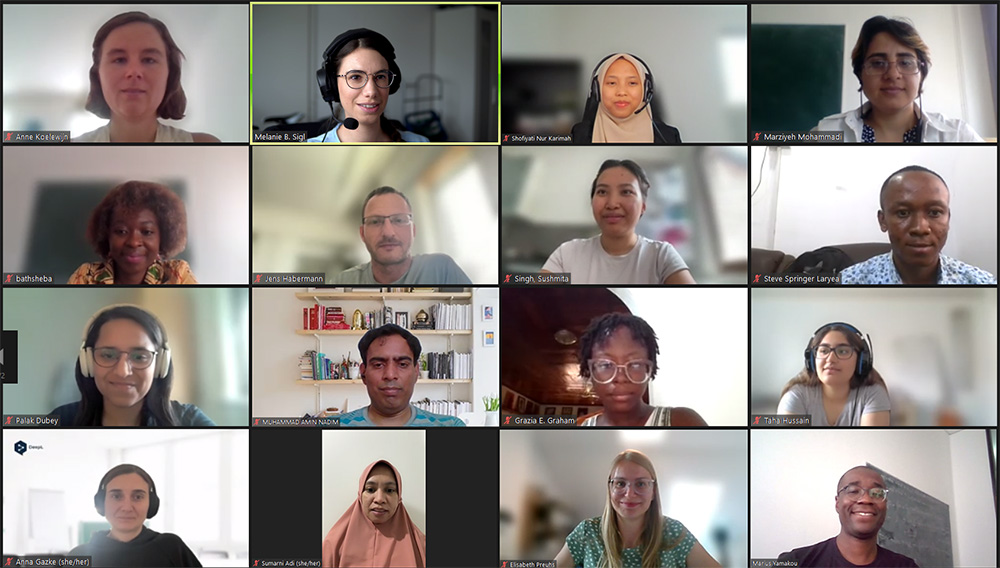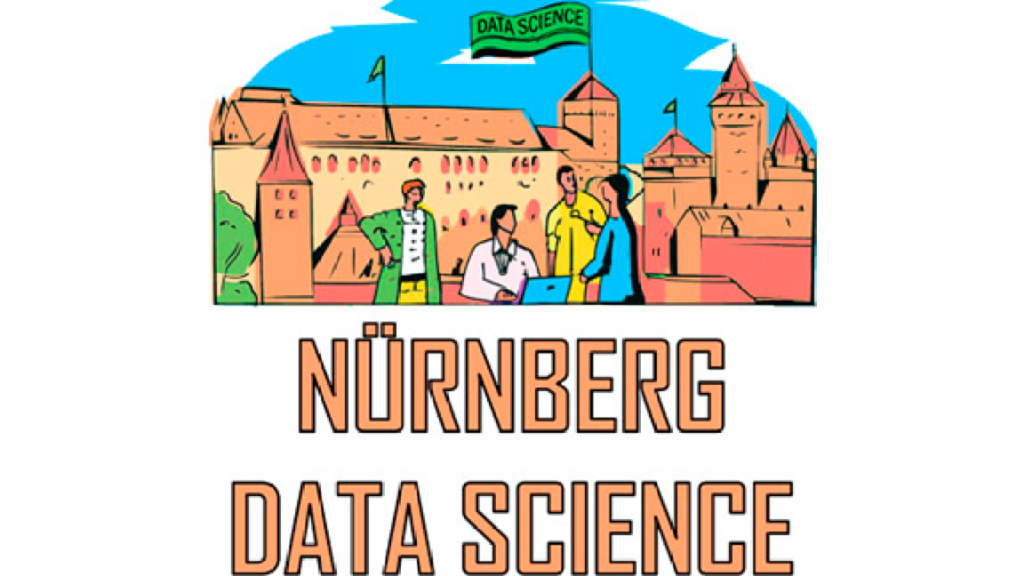Women in Data Science (WiDS) Conference, FAU Erlangen-Nürnberg, 2024

About the Conference
The WiDS Erlangen conference is part of the annual WiDS worldwide conference, organized by Stanford University and held in over 200 locations around the globe. WiDS FAU addresses state-of-the-art developments in Data Science, Artificial Intelligence, and their applications in various scientific and engineering disciplines, as well as strategies for addressing related practical challenges in the industry. The conference features both emerging and experienced women data scientists from academia and industry, who will present their latest research.
Everyone is cordially invited to WiDS, FAU Erlangen-Nürnberg, 20 – 21 June 2024, which will be held online.
Please register before 19 June 2024.
Post-Conference Announcements
Thanks to all the speakers, participants and organisations who made WiDS Erlangen 2024 a great success!

Registration
Participation in the WiDS FAU Erlangen-Nürnberg is free — no conference fee. However, registration is mandatory.
The registration deadline has now passed.
Conference Zoom Link
Upon completing the registration, the Zoom link for attending the conference online will be automatically sent to you via the email you provided during registration.
If you haven’t received the Zoom link, please email us at konferenz-wids[at]fau.de
Confirmed Speakers
Speaker: Prof. Dr. Stefanie Scholz, Professor for Data Science in Social Economy
Keynote Talk: Enhancing Survey Efficiency through Natural Language Processing
Abstract: Surveys represent a cornerstone of market research, traditionally conducted through in-person or telephonic interactions, which have increasingly transitioned to the digital domain. Yet, while online surveys offer expediency and cost-effectiveness, they often encounter challenges regarding data reliability due to factors such as fluctuating participant engagement, low motivation, distractions, dropouts etc. In that presentation, a method for streamlining the survey process in an “automated” fashion will be introduced. Grounded in the concept of User-generated Content (UGC), this approach involves a structured procedure for UGC retrieval. Leveraging advanced techniques like Natural Language Processing (NLP) and expansive language models, user-generated responses to survey questions (items) are identified and assessed with a heightened degree of accuracy. This methodology affords advantages, including higher reliability due to authentic content, the ability to replicate surveys at any time, facilitate item expansion, and simulate past survey scenarios.
Speaker: Melanie B. Sigl, Managing Consultant for ML
Industry Talk: How to deploy your ML project to production with MLOps
Abstract: Despite the promising outcomes from the proof-of-concept phase, a significant number of machine learning projects terminate prematurely, failing to make the transition to production. This phenomenon is commonly attributed to a myriad of challenges. Above all, financial considerations play a notable role, primarily due to the substantial workload necessary for the transition of a prototype to a production-ready model. In this talk we introduce MLOps, its properties and components, and determine what needs to be done to lift and shift any prototype to a production environment of your choice. We define a simple and easy to follow three step workflow and identify potential problems in each step. To guarantee production deployment, we discuss potential solutions to overcome these problems.
Speaker: Dr. Larysa Visengeriyeva, Head of Data and AI
Industry Talk: Business-aligned AI Products
Abstract: Developing innovative software products starts with an understanding that AI/ML should solve a real problem. However, the whole process, from identifying the use case to the introduction of ML models in the company, is not trivial. Larysa will talk about EventStorming and the ML Design Canvas, which help domain experts and developers get a shared understanding of a business domain and identify use cases for AI/ML technologies. Using the ML Design Canvas, we formulate each use case as an ML problem.
Speaker: Ridhima Garg, Large Language Model Student
Industry Talk: Automatic Prompt Engineering
Abstract: In recent years, the development of natural language processing (NLP) models, particularly large-scale language models, has led to significant advancements in various applications such as text generation, question answering, and language understanding. However, the effectiveness of these models often depends on the quality of prompts used during training and inference. There are recent literature in which large language models (LLMs) have displayed impressive capabilities in generating high quality prompts based upon the base prompt. Automatic Prompt Engineering (APE) is optimizing the prompt in order to elicit the best possible performance. It generates instructions for a task that is specified via output demonstrations. The process is framed as a black-box optimization problem, enhancing the efficacy of prompt-driven tasks.
Speaker: Dr. Elisabeth Preuhs, Project Lead/Scientist
Industry Talk: Artificial intelligence for transforming image-guided therapy
Abstract: Artificial intelligence (AI) is a pivotal driver in advancing image-guided and minimally-invasive procedures for the future. It plays a vital role in processing the complex information flow gathered throughout the treatment path, from pre-procedural data to real-time insights during operations. By leveraging AI and Deep Learning the foundation for improved personalized and precise medicine is shaped. In this talk examples of these transformative projects and building blocks from the predevelopment are highlighted, showcasing their potential to deliver optimal outcomes for every patient.
Speaker: Verena Barth, Co-Founder
Industry Talk: Clarity in complexity: Explainable AI (XAI) explained
Abstract: Machine learning (ML) models are already part of our everyday lives and are behind the scenes used for predictions, data-driven decisions and content creation. Due to their inherent complexity, they are mostly incomprehensible to humans and their decisions cannot be understood. The lack of transparency of these “Black Boxes” is a major drawback and an obstacle to their use, especially in critical areas like the medical sector or the military where interpretability is crucial. In Amazon’s AI-supported application process, for example, women were disadvantaged due to their gender, as the AI was trained on the previously male-dominated employee base. Explainable Artificial Intelligence (XAI) uses various methods to address the problem of lack of transparency in ML models and make the results of the solution understandable to humans. This talk will explore the potential of XAI and show how to promote the interpretability of ML models and trust in them without limiting their (learning) performance. Different XAI methods will be presented and categorized. In addition, the criteria to be considered when selecting and evaluating the suitability of XAI methods will be explained. The talk will end with general recommendations for ensuring interpretable ML models within a development and deployment workflow.
Speaker: Daniela Bernhard, Ph.D. Student
Academic Talk: Optimization with uncertain data via a special stochastic gradient algorithm
Abstract: Input parameters of optimization problems are often affected by uncertainties. For example, the parameters can result from empirical observations or measurements. Concerning the inexactness of these data generating methods, the optimization should include the presence of uncertainties in the data. A common way to model uncertainties in the constraints are chance constraints. Instead of requiring a strict condition for the solution of the optimization problem, chance constraints relax the constraint to only hold with a given probability less than one. In this talk, we consider joint chance-constrained problems with continuous distributions. To solve them, we apply an improved version of the Stochastic Gradient Descent algorithm, namely the Continuous Stochastic Gradient method, that has recently been introduced in the paper “CSG: A new stochastic gradient method for the efficient solution of structural optimization problems with infinitely many states” by Pflug et al.. Therefore, we first reformulate and approximate our uncertain problem with smoothing and penalization techniques to apply the gradient method. Under very mild assumptions, our approach is applicable to a wide range of joint chance-constrained problems. We illustrate the efficiency of our approach with an application to gas networks. The numerical experiments demonstrate that the approach quickly finds nearly feasible solutions for this difficult class of problems, even for realistically-sized instances. This is joint work with Frauke Liers and Michael Stingl (both FAU).
Speaker: Shofiyati Nur Karimah, Consultant Data Governance
Industry Talk: Automatic Engagement Estimation for Distance Education
Abstract: Engagement is an essential component of the learning processes associated with positive learning outcomes. Since the learning paradigm has shifted to enable more distance education practices, machine learning-based automatic engagement estimation methods have been proposed as a new way to measure learner engagement in distance education. Nevertheless, implementing automatic engagement estimation should ensure technological and ethical impact responsibilities. This talk will explore a design principle for an end-to-end integration of automatic engagement to measure learners’ emotional engagement in a synchronous distance education practice.
Speaker: Susanna Braun, Cybersecurity Professional at Siemens Healthineers
Industry Talk: Operational Technology (OT) Security
Abstract: In today’s interconnected world, securing our critical infrastructure is crucial. This speech focuses on Operational Technology (OT) security, vital for industries like energy and manufacturing. It highlights the unique challenges of OT environments, such as outdated systems and IT-OT convergence, through real-life examples like the Colonial Pipeline attack. Attendees will discover practical strategies for safeguarding these essential systems, including risk management, network segmentation, and compliance with industry standards. Join this call to understand why OT security is a critical step towards ensuring our future safety and stability.
Speaker: Prof. Dr. Anne Koelewijn, FAU, Chair of Autonomous Systems and Mechatronics
Academic Talk: Understanding Human Movement through Machine Learning
Abstract: Measuring human movement is challenging, since invasive sensors can only be used in exceptional cases. Therefore, we have to rely on what we can see and measure on the outside. This information is very accessible, since many datasets exist that contain human movement recordings. Therefore, it is our goal to try and extract as much information as possible from these available datasets using machine learning methods. In this talk, I will discuss how we have used machine learning to enhance our understanding of human movement. Specifically, I will delve into examples where we used machine learning models to estimate of movement variables “in the wild” using sensors and methods that can be applied outside of a laboratory, and to improve our knowledge on muscle mechanics and energetics.
Program Overview (time zone is CEST)
Thursday, June 20, 2024
| 12:45 – 13:00 | Opening /Welcome Talk Prof. Dr. Andrea Bréard — Vice President Education, FAU |
| 13:00 – 13:45 | Keynote Talk Prof. Dr. Anne Koelewijn, FAU Understanding Human Movement through Machine Learning |
| 13:45 – 14:30 | Industry Talk Susanna Braun, Siemens Healthineers Operational Technology (OT) Security |
| 14:30 – 14:45 | Coffee break |
| 14:45 – 15:30 | Industry Talk Dr. Larysa Visengeriyeva, INNOQ Business-aligned AI Products |
| 15:30 – 16:15 | Industry Talk Ridhima Garg, IAV GmbH Automatic Prompt Engineering |
| 16:15 – 16:30 | Coffee break |
| 16:30 – 17:15 | Industry Talk Verena Barth, Business Buddy AI Clarity in complexity: Explainable AI (XAI) explained |
| 17:15 – 18:00 | Academic Talk Daniela Bernhard, Department of Data Science, FAU Optimization with uncertain data via a special stochastic gradient algorithm |
Friday, June 21, 2024
| 12:45 – 13:30 | Industry Talk Melanie B. Sigl, PRODATO Integration Technology GmbH How to deploy your ML project to production with MLOps |
| 13:30 – 14:15 | Keynote Talk Prof. Dr. Stefanie Scholz, SRH Wilhelm Löhe Hochschule Enhancing Survey Efficiency through Natural Language Processing |
| 14:15 – 14:30 | Coffee break |
| 14:30 – 15:15 | Industry Talk Dr. Elisabeth Preuhs, Siemens Healthineers Artificial intelligence for transforming image-guided therapy |
| 15:15 – 16:00 | Academic Talk Shofiyati Nur Karimah, PRODATO Integration Technology GmbH Automatic Engagement Estimation for Distance Education |
| 16:00 – 16:15 | Closing |
Organizers
Bathsheba Darko (Ambassador WiDS Erlangen FAU), bathsheba.darko[at]fau.de
Melanie B. Sigl (Ambassador WiDS Erlangen FAU), melanie.sigl[at]fau.de
Marius Yamakou (Department of Data Science, FAU), marius.yamakou[at]fau.de
More Information
Email us at konferenz-wids[at]fau.de
Previous Installments
Support and Partners
Special Thanks to Prof. Dr. Jens Habermann for his invaluable support throughout the organization process and to the Department of Data Science.
Community
Code of Conduct: Our community values considerate, respectful, and collaborative behavior from all participants. Read the entire code of conduct.
Follow us: Linkedin




